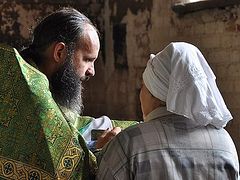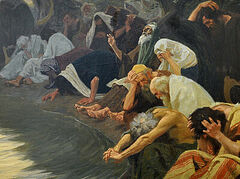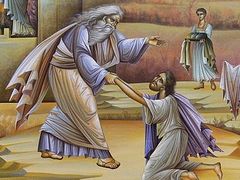Does the Parable of the Prodigal Son, which we have just heard, lead us, brethren, to those reflections that the Church wants to evoke in us through it?
Perhaps many of us listened to it as if half asleep, so that it didn’t evoke any recollections in us, didn’t lead us to any reflections? Others, perhaps, listening to the parable and the Church hymns accompanying it were again captivated by its beauty and poignancy? But that’s not all that the holy Church desires—it wants us to listen to the parable and come to the awareness that we ourselves are prodigal sons and daughters, that like the prodigal son we might fall down in repentance before the Heavenly Father and call out to Him: Father, I have sinned against Heaven, and before Thee (Lk. 15:18).
Have we done this, brethren? Have we felt the bitterness of repentance and the desire to fall down before the Heavenly Father, if not to the ground with tears and great self-abasement, then at least mentally, with sorrow in our hearts?
Of course, in this proud age, very few are inclined to call themselves prodigal sons and daughters. And they’re right, perhaps, from the world’s point of view, from the point of view that’s openly proclaimed in our day when teenagers of both sexes walk up and down the streets of the city shouting: “Long live free love!” But we mustn’t forget that after the judgment of the world, we will still be judged by the judgment of the Gospel of Christ.
Will we really be able to justify ourselves before God simply because we haven’t sunk into fornication and profligacy like the prodigal son in the parable, because we haven’t lost the purity of our bodies? Don’t impure thoughts and desires sometimes defile our bodily temples even more than the deeds committed by the body? If we’re filled with impure and passionate thoughts, can we really become temples of the Holy Spirit, as we’re called to do in today’s Epistle reading (1 Cor. 6:19)? Let us recall the word of Christ about how even he who gazes upon his wife with lust already commits adultery with her in his heart (Mt. 5:28).
So, do we protect ourselves from impure thoughts and desires as we walk the streets, when we’re too fond of reading books that arouse impure dreams and images of carnal love, when we willingly talk about such things?
Let us measure our spiritual disposition with the measure shown us by the Lord when He said: Thou shalt love the Lord thy God with all thy heart, and with all thy soul, and with all thy mind (Mt. 22:37)! Meanwhile, deluding ourselves with the thought that this or that pleasure of the world is permitted, or not forbidden, in the Gospel of Christ, we’re ready to indulge in them without measure or reflection, with a passion that completely extinguishes love for Christ in our hearts. Of course, the Gospel doesn’t forbid enjoying the blessings of the world, but to what degree? Didn’t the Lord command all His followers (not just monastics) to leave and even hate their wives, children, brothers, sisters, and possessions for His sake (Lk. 14:26) should they begin to love them more than Christ; to leave them, if not in deed, then by will, by suppressing the imbalanced love in the heart that extinguishes love for Christ?
Of course, it’s not forbidden for people to enjoy the goods of the world, to get married, or to use the goods of the world in general—but how should we use them? So that both they that have wives be as though they had none; And they that weep, as though they wept not; and they that rejoice, as though they rejoiced not; and they that buy, as though they possessed not (1 Cor. 7:29-30); that is, without indulging in love for the world with some all-consuming passion.
Isn’t this why the Lord, Who didn’t forbid marriage and enjoyment of the blessings of this world, compared an excessive taste for all of this with the state of the depraved world before the global flood or during the destruction of Sodom and Gomorrah: And as it was in the days of Noah, so shall it be also in the days of the Son of Man. They did eat, they drank, they married wives, they were given in marriage, until the day that Noah entered into the ark, and the flood came, and destroyed them all. Likewise also as it was in the days of Lot; they did eat, they drank, they bought, they sold, they planted, they builded; But the same day that Lot went out of Sodom it rained fire and brimstone from Heaven, and destroyed them all. Even thus shall it be in the day when the Son of Man is revealed (Lk. 17:26-30)?
Therefore, let the parable we’ve heard now remind us, brethren, of all the paths of our life that we’ve trod prodigally! Let us not justify ourselves and exclude ourselves from the ranks of the prodigal sons simply because we’re not mired in debauched deeds: After all, delighting in impure thoughts and desires in the heart is spiritual fornication, because evil deeds are certainly born from thoughts, as from a seed, when we don’t immediately drive them out.
Let our thoughts be filled with the same hatred that the captive Jews were filled with for their enemies as they sang: Blessed shall he be who shall seize and dash thine infants (that is, Babylon) against the rock (Ps. 136:12). According to the spiritual explanation of the holy ascetic Fathers, we should understand the infants of Babylon as the thoughts.
May passionate thoughts and desires not extinguish our love for our Father’s house, as the predilection for the goods of the world caused certain captive Jews not to return home from the Babylonian exile! Let us, like the best part of the captive Jews, nourish the same love for the Father’s house, arousing ourselves to it with the words of their hymn: If I forget thee, O Jerusalem, let my right hand be forgotten. Let my tongue cleave to my throat, if I remember thee not, If I set not Jerusalem above all other, as at the head of my joy (Ps. 136:6-8), of all my earthly pleasure and joy.
May love not fade in our hearts, especially for this house in which we gather for prayer and spiritual teachings, for the Lord called the Temple His Father’s house par excellence when He said: My house shall be called the house of prayer (Mt. 21:13). Whoever comes and stands in this house reluctantly, coldly, even with bitterness, is a prodigal son, who has left his Father’s house to travel into a far country (Lk. 15:13). Therefore, let us love this house; let us come here more often; and with love, to our Heavenly Father!
Amen.




